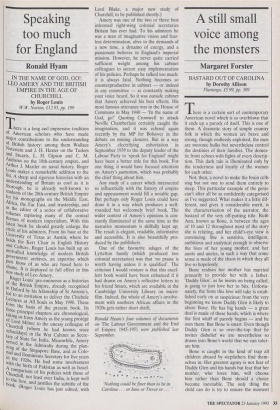A still small voice among the monsters
Margaret Forster
BASTARD OUT OF CAROLINA by Dorothy Allison Flamingo, £5.99, pp. 309 here is a certain sort of contemporary American novel which is so overblown that it ends up a parody of itself. This is one of them. A dramatic story of simple country folk in which the women are brave and strong, though endlessly exploited, the men are moronic hulks but nevertheless control the destinies of their families. The domes- tic front echoes with fights of every descrip- tion. This dark tale is illuminated only by the tenderness and loyalty of the women for each other. Not, then, a novel to make the brain cells sing but not one to send them entirely to sleep. This particular example of the genre can't after all be as confidently categorised as I've suggested. What makes it a little dif- ferent, and gives it considerable merit, is the characterisation of the narrator, the bastard of the very off-putting title. Ruth Ann, known as Bone, is between the ages of 10 and 12 throughout most of the story she is relating, and her child's-eye view is convincing. She is sensitive, intelligent, ambitious and analytical enough to observe the lives of her young mother, and her aunts and uncles, in such a way that some sense is made of the chaos in which they all live so hopelessly. Bone realises her mother has married primarily to provide her with a father. 'Daddy Glen', as he insists on being called, is going to just love her to bits. Unfortu- nately, the form this love will take is estab- lished early on as suspicious: from the very beginning we know Daddy Glen is likely to abuse Bone. He has big hands — a great deal is made of these hands, which is where the first whiff of parody begins — and he uses them. But Bone is smart. Even though Daddy Glen is so over-the-top that he invites disbelief we are nevertheless so drawn into Bone's world that we can toler- ate him. Bone is caught in the kind of trap all children abused by stepfathers find them- selves in. Her greatest agony is not fear of Daddy Glen and his hands but fear that her mother, who loves him, will choose him rather than Bone should a choice become inevitable. The only thing the child can do is try to ensure the moment of choice never comes.
The tension comes from knowing this choice will indeed be made. When it is the outcome is a surprise. There are no neatly tied up ends, no dodging the real issues. The ring of truth finally lifts the novel out of the realm of cliché. But even so there remains an uneasiness here: a fine central character, a strong degree of compassion, but also a stagey quality to much of the dialogue and to the numerous set-piece incidents. Inside this heavily padded book is a much slimmer, tauter one trying to get out. I wish it had made it.



























































 Previous page
Previous page